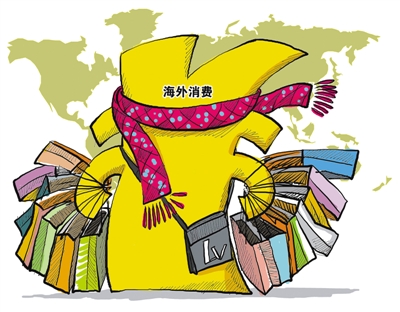Over 14 million people traveled abroad from China during the Lunar New Year holidays of 2015. These people are called ‘Youke’, or traveler, in Chinese. Jeju Island, Myeong-dong, Busan, and a variety of Korea’s tourist attractions were crowded with Chinese tourists. Korea’s summer airline schedules focus on attracting the Youke to Korea. Korean Air increased their flights to 23 Chinese locations and operates them 300 times a week. They are considered a ‘big player’ in the tourism game. Asiana Airlines also increased flights from China to Korea during low season to snag some of this travel market. So who are the Youke?
 |
| ▲ Big guest of Korea (baidu) |
Chinese ‘Youke’ are known for buying large quantities of goods at once and not just any kind, they like the expensive stuff. According to the World Tourism Cities Federation (WTCF), there were 98.19 million Youke in 2013 and their total consumption was 12.87 billion dollars. This means they each spent about 3,252 dollars. In addition, 57.8 percent reported that shopping was the most important part of their travels and 42.93 percent said their main purpose of travel was shopping.
This kind of tourism has made reaching the Youke an allimportant phenomenon. For instance, Australia spent 25 million dollars advertising for Chinese tourists. Also, Harrods in the U.K. hired 70 employees who are able to speak Chinese. Increasing
efforts to attract Chinese people around the world is becoming fierce. Although many countries have tried to attract the Youke tourist, Korea has earned first place in the competition. An interview with the Korean Tourism Organization (KTO) revealed that 12.6 million Chinese tourists visited Korea during the 2014 Lunar New Year holiday season, a 30 percent increase over 2013.
There are positive effects from this phenomenon such as increasing sales and tourism. However there are also some downsides such as the Youke’s attitude when visiting abroad. For example, Ewha Womans University’s ECC building is becoming a hot place for Youke tourists, and the Chinese are becoming a big hand for purchasing in Jeju. The Dankook Herald (DKH) met Lim Ji-hun (President, International Student Council) to ask about the Youke phenomenon. Mr. Lim said, “China consists of diverse ethnic groups. Only judging someone by their national character has caused some tourists to leave false impressions.” During this interview we learned how Chinese international student’s experience unpleasant attitudes due to the impressions left by the Youke.
What do 12.6 million Youke do in Korea? Many Chinese tourists clean out the shops around Myeong-dong, and Dongdaemun. However, the number of Chinese tourists also enjoying tourism alone or in small groups has also increased lately. This suggests that Chinese tourists also come to Korea as travelers or on a ‘Free Independent Tour’ (FIT). The FIT has become a general trend for younger people. They search for some travel tips about the holiday destination and enjoy their time with satisfaction by exchanging information on the Internet. Youkes also now want to be considered a regular consumer of Korea. Sightseeing is no longer their only goal for travel. Accordingly, some people insist that we should recognize them as we would Korean consumers and not just foreign tourists.
Has Korea adapted well to this change in the form of tourism? Satisfaction survey results published by the KTO of Chinese tourists, ranked Korea in 14th place among the 16 countries surveyed. Revisits of Chinese tourists were a mere
30 percent. Revisiting for Chinese tourists was low and ‘communication’ issues were shown to be a big reason. In particular, an individual traveler who is not accompanied by a group or tour guides, will have lots of complaints when they
take taxis. They complained that they could not even communicate with English.
DKH interviewed the KTO about Korea’s efforts to attract Youkes. The Chinese Department of the KTO presented their efforts with a product targeted at individual tourism. They distributed survival kits to Youkes who are planning a trip to Korea. They said, “The survival kit is a card representing a variety of situations that they may confront from arrival to departure in Korea and China. By providing tourists with the necessary language for each context, Chinese travelers will be better able to communicate with Koreans without experiencing any discomfort.” We learned the KTO is making many efforts to address the Youke’s complaints. However during interview we could sense the need for further improvements remained.
Chinese visitors to Korea exceeded 50 percent of the total of foreigner tourists last year. Their consumption needs have a great impact on our lives. We need to learn more about their needs and better address them. Furthermore, we should not judge the Youke from one side. We need to pay more attention to our big guests and make them feel welcome.
이지선 tiny119@naver.com

![[Campus Magnifier] Let's Surf the Library!](/news/photo/202404/12496_1765_4143.jpg) [Campus Magnifier] Let's Surf the Library!
[Campus Magnifier] Let's Surf the Library!
![[Campus Magnifier] Let's Surf the Library!](/news/thumbnail/202404/12496_1765_4143_v150.jpg)





